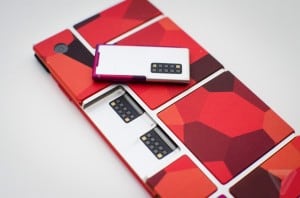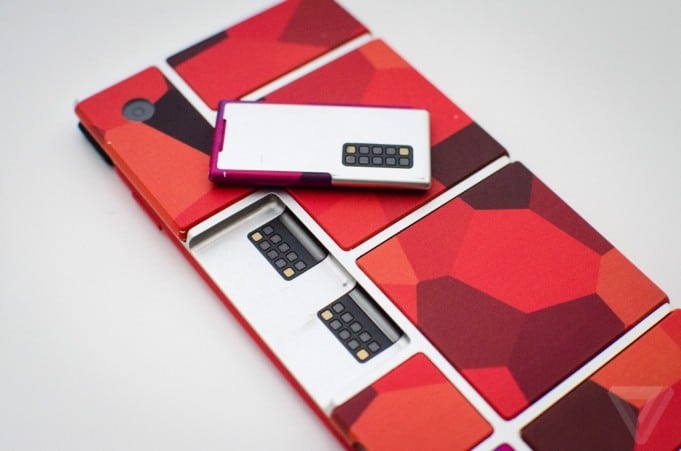
Imagine a smartphone you could take apart and custom build. You could snap in a 4K camera module. Or maybe you prefer adding in extra battery power. Or maybe you need extra storage – simple, just snap in a third party ram module. The possibilities are endless, potentially limited only by what third party developers and manufacturers dream up. Call it the Lego smartphone.
That vision comes courtesy Google. It’s called Project Ara and. The small team, part of Advanced Technology and Projects (ATAP) within the search giant, was actually part of the Motorola Mobility and Lenovo deal – and it’s been developing the concept now for about a year.
Who doesn’t love working on the next cool thing?
Project Ara this week has received plenty of visibility this week thanks in part to a Google preview event. Actual phones based on the modular technology could–could–ship in 2015. They would be marginally bigger than current models, but because of their hot-swappable upgrades (connected via electropermanent magnets) would be less vulnerable to obsolescence (Project Ara phones are expected to have a 5-6 year lifespan). It’s worth noting that the Android operating system currently does not support Ara. A modular version, though, could also be in the cards for next year.
There’s plenty of photos, and hand-ons, and opinion pieces across the Internet about the bold vision. Many of them are interesting reads. There appears to be a general consensus that the concept is cool, that it pushes the envelope, and is a radical departure from other notions of where smartphone and mobile could be headed. There’s also equal skepticism. Iffy. That would be the word to describe the likelihood of Project Ara bearing fruit.
But, that’s okay.
Whether or not these modular phones ever make it into the hands of consumers, Google wins.
Much like it did with Google Glass, Project Ara is Big Idea. One that requires team members to break down barriers, and literally think out of the (smartphone) box. If the ultimate product does not resemble the current thinking within the team, you can bet that trickle down ideas, and technical innovations will find their way into the company’s other products and services. In that sense, this two-year experiment resembles a concept car. Often seen as a halo, automakers use fantastical interpretations of future models to stoke consumer interest, market feedback, and brand awareness. Google Glass has done exactly that — and by the looks of it could be a viable consumer product in spite of all the bumps over the past year related to privacy.
And there’s more.
Who doesn’t love working on the next cool thing?
By allowing small teams to dream big, Google fuels its innovation engine. That in turn attracts talent. New blood injects further creativity to problem solving. The cycle reinforces itself. This isn’t new of course. Many tech companies, especially here in Silicon Valley, have incubation groups, labs, forward thinkers, evangelists, and otherwise earmarked employees not working on day-to-day product releases.
Regarding the Project Ara concept itself, I’m not entirely convinced at it stands today. Here’s why. Smartphones are quickly becoming disposable commodities. There was a time when we’d go years between upgrades. While some–ahem, my wife on iPhone 4–still are slow, and reticent even, to upgrade on a regular basis, for most of us it has become the norm. Carrier contracts (dying as they will) are based on that notion, and are typically based on a two-year term. With lower prices, increased selection, and increasing unlocked freedom (Google Play Edition phones, for example), when we buy phones today we’re not really thinking 4-5 years down the road – because at that point we will be two models advanced from today.
Still, unlocked phones go for $600+ today. That alone could throw a wrench into my skepticism and bolster the idea of a modular device that can transform itself year over year, requiring mere incremental investments rather than significant one-time outlays.
However Project Ara plays out, it will be interesting to watch. Whether it results in shipping product, Google wins either way.


